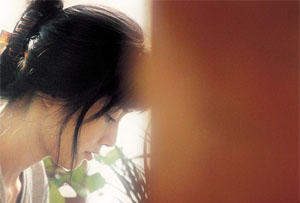
When I finished watching Lee Yoon-ki's debut film This Charming Girl last Saturday, I didn't know what to say about it. Some parts seemed extraneous somehow and the film as a whole didn't seem to coalesce into something tangible. I couldn't see what everyone was talking about that made the film so good.
Over the course of the next days, however, I couldn't stop thinking of this film. By the next day, my opinion of this film changed vastly, and I now consider the film to be one of the best of the year. Quiet, delicately restrained and contemplative, This Charming Girl is an interesting picture into the psyche of a woman struggling to break free.
Break free from what, you may ask? You'll have to see the movie to find out. The movie begins with us seeing the main character, Jeong-hye (portrayed superbly by Kim Ji-soo in her first film role,) going through the motions of everyday life. She works as a postal worker, quietly going through her days silently toiling, seemingly aimless. As the movie progresses, we notice that something is different with Jeong-hye. She spends moments of quiet contemplation, and sometimes engages in strange little things like impulsively buying kimchi from home shopping. Director Lee states that it's not that Jeong-hye couldn't make kimchi for herself, it's more of the fact that she's curious and wants to try it out on a whim.
She takes this attitude to a new level when she decides to take a chance. As we see how she deals with the repercussions of this act, we see more and more through the layers of her past and the things that has shaped her life up until now. What we see by the end of 99 minutes is a small glimpse into someone's heart.
The camerawork in this film is very interesting, to say the least. There are lots of handheld shots (I wouldn't be surprised if I found out the entire film was handheld) and lingering static shots with a good eye for composition. I also noticed that there are few long-distance, wide angle shots in the movie (I counted 10, give or take a few.) Most of the scenes lavished its attention on Jeong-hye, her face, her expressions, her little motions and quirks, never capturing her more than a few meters away, giving the film a slightly voyeuristic (or personal, depending on your interpretation) feel. But this is her movie, after all.
Some people may be put off by the languid pace the film takes; I do admit that watching a movie like this takes a bit of patience, but in my opinion the payoff is extremely rewarding.
As the film cuts to a final shot of Jeong-hye's face, we try to find the meaning in her expression. Was it sadness? Or was it the promise of hope? Lee wisely lets us make the decision ourselves; or perhaps we can say that Lee leaves it to Jeong-hye - in the end, it's ultimately her life.
Break free from what, you may ask? You'll have to see the movie to find out. The movie begins with us seeing the main character, Jeong-hye (portrayed superbly by Kim Ji-soo in her first film role,) going through the motions of everyday life. She works as a postal worker, quietly going through her days silently toiling, seemingly aimless. As the movie progresses, we notice that something is different with Jeong-hye. She spends moments of quiet contemplation, and sometimes engages in strange little things like impulsively buying kimchi from home shopping. Director Lee states that it's not that Jeong-hye couldn't make kimchi for herself, it's more of the fact that she's curious and wants to try it out on a whim.
She takes this attitude to a new level when she decides to take a chance. As we see how she deals with the repercussions of this act, we see more and more through the layers of her past and the things that has shaped her life up until now. What we see by the end of 99 minutes is a small glimpse into someone's heart.
The camerawork in this film is very interesting, to say the least. There are lots of handheld shots (I wouldn't be surprised if I found out the entire film was handheld) and lingering static shots with a good eye for composition. I also noticed that there are few long-distance, wide angle shots in the movie (I counted 10, give or take a few.) Most of the scenes lavished its attention on Jeong-hye, her face, her expressions, her little motions and quirks, never capturing her more than a few meters away, giving the film a slightly voyeuristic (or personal, depending on your interpretation) feel. But this is her movie, after all.
Some people may be put off by the languid pace the film takes; I do admit that watching a movie like this takes a bit of patience, but in my opinion the payoff is extremely rewarding.
As the film cuts to a final shot of Jeong-hye's face, we try to find the meaning in her expression. Was it sadness? Or was it the promise of hope? Lee wisely lets us make the decision ourselves; or perhaps we can say that Lee leaves it to Jeong-hye - in the end, it's ultimately her life.
No comments:
Post a Comment